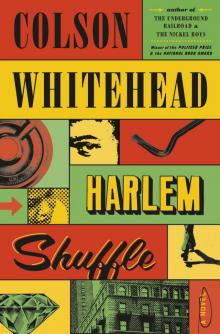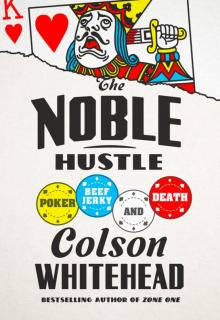- Home
- Colson Whitehead
Harlem Shuffle Page 2
Harlem Shuffle Read online
Page 2
There was a gang of younger kids on his case all the time, Ruby’s classmates. The rough boys his age left him alone, they knew him from before and let him be because they had played together, but Oliver Handy and his group, they were of that feral breed, street. Oliver Handy, two front teeth knocked out since whenever, never let him pass without starting something.
Oliver and his group made fun of the spots on his clothes, which didn’t fit properly and so they made fun of that in addition, they said he smelled like a garbage truck. Who had he been back then? Scrawny and shy, everything out of his mouth half a stammer. He shot up six inches junior year, as if his body knew it better catch up to handle his adult responsibilities. Carney in the old apartment on 127th, no mother, father aprowl or sleeping it off. He left for school in the morning, closed the door on those empty rooms and steeled himself for whatever lay beyond. But the thing was, when Oliver made fun of him—outside the candy store, in the back stairwell at school—he’d already taught himself how to properly wash out a stain, hem his pants, take a good long shower before school. He made fun of him for who he’d been before he got his shit together.
What put a stop to it was smacking Oliver’s face with an iron pipe. Curved in a U like it came from under a sink. The pipe had appeared in Carney’s hands it seemed, cast out of the empty lot at the corner of Amsterdam and 135th where they surrounded him. His father’s voice: That’s how you handle a nigger who fucks with you. He felt bad seeing Oliver at school, swole up and slinking. Later he learned that his daddy had ripped off Oliver’s daddy on some scam, stolen tires, and maybe that explained the whole thing.
It was the last time he raised his hand. The way he saw it, living taught you that you didn’t have to live the way you’d been taught to live. You came from one place but more important was where you decided to go.
Ruby had decided on a new city and Carney chose life in the furniture business. A family. If it looked opposite of what he knew when he was little, it appealed.
He and Ruby talked crap about the old school, the teachers they hated. There was overlap. She had a nice, round face, and when she laughed he got the sense D.C. had been a good choice. No shortage of reasons to get out of Harlem if you could swing it.
“Your father used to work at the garage around the corner,” she said.
Miracle Garage was the place his father worked at sometimes, when his main business ran dry. Hourly work, steady. The owner, Pat Baker, had been a running buddy of his father’s before he went straight. Straight as in less bent; it cannot be said that every vehicle on the premises had its papers right. The garage had churn, as Carney called it, like Aronowitz’s. Like his place. Stuff comes in, it goes out, like the tides.
Pat owed his daddy from back when and gave him work when he needed it. “Sure,” Carney said, waiting for the kicker. Usually when someone mentioned his father it was a prelude to a disreputable story. I saw two policemen haul him away outside Finian’s or He was beating this sucker with the lid of a garbage can. Then he had to figure what to make his face look like.
But she didn’t share any shabby anecdote. “It closed down a few years ago,” Ruby said.
They did a deal for the couch and the matching armchair.
“How about that radio?” she asked. It was next to a small bookcase. Hazel Brown had kept a bunch of artificial flowers in a red vase on top of it.
“I’ll have to pass on the radio,” he said. He paid the super some bucks to help him carry the sofa down to the truck, he’d send Rusty tomorrow for the armchair. Sixty-four steps.
* * *
* * *
Carney’s Furniture had been a furniture store before he took over the lease, and a furniture store before that. In sticking around for five years, Carney had outlasted Larry Early, a repellent personality ill-suited for retail, and Gabe Newman, who lit out in the dead of the night, leaving behind a clutch of fuming creditors, his family, two girlfriends, and a basset hound. A superstitious sort might have deemed the location cursed in regards to home goods. The property wasn’t much to look at, but it might make a man his fortune. Carney took the previous tenants’ busted schemes and failed dreams as a kind of fertilizer that helped his own ambitions prosper, the same way a fallen oak in its decomposition nourishes the acorn.
The rent was reasonable for 125th Street, the store well-situated.
Rusty had the two big fans going on account of the June heat. He had a tiresome habit of comparing the weather in New York City to that of his native Georgia, in his stories a land of monstrous rainfall and punishing heat. “This is nothing.” Rusty maintained a small-town sense of time in all things, devoid of urgency. Although not a natural salesman, during his two years in the store he had cultivated a brand of bumpkin charisma that appealed to a subset of Carney’s customers. Rusty’s newly conked hair, red and lush—courtesy of Charlie’s on Lenox—gave him a new confidence that contributed to an uptick in commissions.
Conk or no conk, nothing was happening in the store that Monday. “Not a single soul,” Rusty said as they carried Hazel Brown’s sofa to the gently used section, his voice a lament, which Carney found endearing. Rusty reacted to routine sales patterns like a farmer scanning the skies for thunderheads.
“It’s hot,” Carney said. “People have more things on their mind.” They gave the Heywood-Wakefield prime placement. The gently used section occupied twenty percent of the showroom floor—Carney calculated to the inch—up from ten percent last year. It had been a slow creep for the used merchandise, once Carney noticed its pull on the bargain hunters, the payday strollers, the just-walking-by types who wandered in. The new goods were top-notch, he was an authorized dealer for Argent and Collins-Hathaway, but the secondhand stuff had durable appeal. It was hard to pass up a deal when faced with choosing a warehouse delivery or walking out that day with a wingback lounge chair. Carney’s careful eye meant they were getting nice furniture, and he took the same care with the secondhand lamps, electronics, and rugs.
Carney liked to walk his showroom before opening. That half hour of morning light pouring through the big windows, over the bank across the street. He shifted a couch so it wasn’t up against the wall, straightened a sale sign, made neat a display of manufacturer brochures. His black shoes tapped on wood, were silenced by the plush give of an area rug, resumed their sound. He had a theory about mirrors and their ability to reflect attention to different quadrants of the store; he tested it on his inspection. Then he opened the shop to Harlem. It was all his, his unlikely kingdom, scrabbled together by his wits and industry. His name out front on the sign so everyone knew, even if the burned-out bulbs made it look so lonesome at night.
After checking the basement to make sure Rusty had put the TVs where he’d asked, he retreated to his office. Carney liked to keep up a professional appearance, wear a jacket, but it was too hot. He wore a white short-sleeve shirt, sharkskin tie tucked between the middle buttons. He stuck it in there when he packed the radios so it wouldn’t be in the way.
He ran the day’s numbers at his desk: down what he’d paid for the radios years before, down the money for the TVs and the Brown lady’s furniture. Cash on hand was not heartening, if the heat kept up and the customers stayed away.
The afternoon dwindled. The numbers didn’t fit, they never did. This day or any other. He double-checked who was late on their payments. Too many. He’d been thinking about it for a while and decided to end it: no more installment plans. His customers loved them, sure, but he couldn’t afford the lag anymore. Sending collectors wore him down. Like he was some crime boss dispatching muscle. His father had done some work like that, banging on the front door, everybody on the hall looking to see what the fuss was. The occasional follow-through on a threat…Carney stopped himself. He had his share of deadbeats and was a soft touch when it came to extensions and second chances. He didn’t have the traffic right now to extend himself. Elizabet
h would reassure him and not let him feel bad about it.
Then it was almost closing time. In his mind, he was already a block from home when he heard Rusty say, “It’s one of our top sellers.” He looked through the window over his desk. The first customers of the day were a young couple—pregnant wife, husband nodding earnestly at Rusty’s patter. In the market, even if they didn’t know it maybe. The wife sat on the new Collins-Hathaway sofa, fanning herself. She was going to drop the baby any day. Looked like she might deliver right there on the stain-resistant cushions.
“Can I get you a glass of water?” Carney asked. “Ray Carney, I’m the owner.”
“Yes, please.”
“Rusty, can you get the young lady a glass of water?” He removed his tie from between the buttons of his shirt.
He had before him Mr. and Mrs. Williams, new additions to Lenox Avenue.
“If that sofa you’re resting on is familiar, Mrs. Williams, that’s because it was on The Donna Reed Show last month. The scene at the doctor’s office? It’s really taken off.” Carney ran down the attributes of the Melody line. Space-age silhouette, scientifically tested for comfort. Rusty gave Mrs. Williams the glass of water—he’d taken his time, to ease Carney’s transition into the sale. She drank from the glass, cocked her head, and listened thoughtfully, to Carney’s pitch or the creature in her womb.
“To be honest,” the husband said, “it’s so hot, sir, Jane needed to sit down for a minute.”
“Couches are good for sitting—that’s what they’re for. What line are you in, Mr. Williams, if I may ask?”
He taught math at the big elementary school on Madison, second year there. Carney lied and said he was never that good at math, and Mr. Williams started talking about how it’s important to get kids interested early so they don’t get intimidated. Rote, like it came from some new teaching manual. Everybody had their pitch.
Mrs. Williams was due in two weeks with their first. A June baby. Carney tried to come up with a folksy bit about June babies but couldn’t pull it off. “My wife and I, we’re expecting our second in September,” he said. Which was true. He pulled the picture of May from his wallet. “That’s her birthday dress.”
“Truth is,” Mr. Williams said, “it’ll be a while before we can afford a new couch.”
“No harm in that. Let me take you around,” Carney said. Not to feign interest after a glass of water would be impolite.
It was hard to conduct a proper showroom tour with one party anchored in a spot, panting. The husband shrank from the merchandise when he came too close to it, as if proximity plucked money out of his pockets. Carney remembered those days, everything too dear and too necessary at the same time, just him and Elizabeth making their way in the world as newlyweds. He had the store then, paint still fresh; no one thought he’d make a go of it except her. At the end of the day when she propped him up and told him he could do it, he puzzled over these alien things she offered him. Kindness and faith, he didn’t know which box to put them in.
“The modular setup makes every inch of your room livable,” Carney said. He sold the virtues of Argent’s new sectional, which he really did believe in—the new saddle finish and tapered legs made it appear to float in the air, look—as his thoughts ran elsewhere. These kids and their striving. Actors did this every night, he figured, the best of them, delivering their lines while sifting through last night’s argument, or suddenly reminded of overdue bills by a man in the fifth row who had the same face as the man at the bank. You’d have to come every night to detect an error in the performance. Or be another member of the company, suffering your own distractions and recognitions at the same time. He thought, It’s hard to make your start in this city when you have no help—
“Let me see it,” Mrs. Williams said. “I just want to see how it feels for a moment.”
She’d popped up. The three of them stood before the Argent, the turquoise cushions like cool water beckoning on a hot day.
She had been listening the whole time, sipping. Mrs. Williams took off her shoes and lay across the curved left arm. She closed her eyes and sighed.
They did a deal for a smaller than usual deposit, with a generous installment plan. Ludicrous, the whole thing. Carney locked the door behind them after they finished the paperwork to prevent another lapse in judgment. Argent’s Metropolitan line was a sound investment, with its chemically treated bouclé cushions and Airform core, voted most comfortable by four out of five respondents in a blind test. It would last a long time, through one kid and another. He was glad he hadn’t told Rusty or Elizabeth about eliminating time payments.
Rusty clocked out and it was just him. Down for the day after all the cash he dropped. He didn’t know where the rent was going to come from, but it was still early in the month. You never know. The TVs were smart and they were a nice couple and it was good to do for them what no one did for him when he was young: give a hand. “I may be broke, but I ain’t crooked,” he said to himself, as he often did at times like this. When he felt this way. Weary and a little desperate, but also high-hearted. He turned off the lights.
TWO
“Oh, Ruby—yes. She was sweet,” Elizabeth said. She passed the water pitcher. “We played volleyball together.”
In keeping with their history, his wife remembered the dead lady’s daughter, but had no high-school recollection of the man she was going to marry. Carney and his wife had biology class together, and civics, and one downpour Thursday he walked her four blocks under his umbrella, out of his way even. “Are you sure?” Elizabeth said. “I thought that was Richie Evans.” Her teenage memory rendered him a blank space, like the one left after she cut out a paper doll for May. Carney had yet to devise a comeback to her teasing about his inconspicuous profile back then: “It’s not my fault you were you.” He’d think of it one day.
Dinner was Caw Caw chicken. The recipe came from McCall’s, but May pronounced it caw, and it stuck. It was bland—the main seasoning appeared to be breadcrumbs—but they were fond of it. “What if the baby doesn’t like chicken,” Elizabeth asked one night. “Everybody likes chicken,” he responded. They had a good thing going, the three of them, wonky plumbing aside. The new arrival might alter the dynamic in the house. For now, they still had their unspoiled delight in Elizabeth’s main dish, served tonight with rice and stewed green beans, pale ribbons of bacon adrift in the pot.
May squeezed a green bean to mush. Half went in her mouth, the rest on her polka-dot bib. Under her high chair, the linoleum was a mottle of stains. May took after her mother, and her grandmother, had those big brown Jones women’s eyes that took in everything and gave no more than they decided to permit. She had also inherited their will, mulish and impenetrable. Take a look at those beans.
“Alma go home early?” Carney asked. With Elizabeth on bed rest, her mother came by most days to lend a hand. She was great help with May, if not the kitchen. Even if dinner hadn’t been one of his wife’s trademark dishes, tipping him off, the food tasted good, which meant Alma hadn’t had a hand in it. Elizabeth’s mother cooked the way she did most things, with a healthy sprinkling of spite. In the kitchen it manifested on the tongue.
“I told her we didn’t need her today,” Elizabeth said. A euphemism for Alma meddling too much, necessitating a cooling-off period after Elizabeth lost her temper.
“You didn’t do too much?”
“Just to the store. I had to get out.”
He wasn’t going to make a fuss about it. After she fainted a month ago, Dr. Blair told her to take a break from work, stay off her feet. Let her body devote itself to the job at hand. Stillness went against her character; the more she had on her plate, the happier she was. She had resigned herself to a few months of humdrumery, but it drove her batty. Alma’s constant harping made it worse.
He changed the subject. The store was quiet all day except at the end, he said. “They l
ive in Lenox Terrace. He said he thought they still had some three-bedrooms available.”
“How much?”
“I don’t know, more than what we pay now. I thought I’d take a look.”
He hadn’t brought up moving in more than two weeks. No harm in taking the temperature. One source of Alma’s carping was the size of their apartment, and for once Carney agreed with her. For Elizabeth’s mother, their small apartment was another way her daughter had settled for less than she deserved.
Alma used the word settled the way the less genteel used motherfucker, as a chisel to pry open a particular feeling. Elizabeth had settled for her position at the travel agency, after her parents’ careful maneuverings to elevate her, turn her into an upstanding Negro doctor, upstanding Negro lawyer. Booking hotels, airplane flights—it was not what they intended for her.
She’d settled for Carney, that was clear. That family of his. From time to time, Carney still overheard his father-in-law refer to him as “that rug peddler.” Elizabeth had brought her parents to the store to show it off, on a day Moroccan Luxury happened to deliver a shipment. The rugs were marvelous specimens, couldn’t keep them in stock, but the delivery men that day were disheveled and hungover—they usually were—and on seeing them slide the rugs down the basement chute, Mr. Jones muttered, “What is he, some sort of rug peddler?” Knowing full well the range of home goods Carney sold, all of which were of fine quality. Go into a white store downtown, it was the same stuff, Moroccan Luxury sold all over. Not to mention—what was wrong with selling rugs? It was more honorable than grifting the city out of taxes, Mr. Jones’s specialty, no matter how he dressed it up.
And their sweet Elizabeth had settled for a dark apartment with a back window that peered out onto an air shaft and a front window kitty-corner to the elevated 1 train. Weird smells came in one way, trains rumbled in the other, all hours. Surrounded by the very element they’d tried to keep her away from her whole life. Or keep down the block, at least. Strivers’ Row, where Alma and Leland Jones had raised her, was one of the most beautiful stretches in Harlem, but it was a little island—all it took was a stroll around the corner to remind its residents that they were among, not above.

 The Nickel Boys
The Nickel Boys Zone One
Zone One The Underground Railroad
The Underground Railroad The Colossus of New York
The Colossus of New York The Intuitionist
The Intuitionist Apex Hides the Hurt
Apex Hides the Hurt Harlem Shuffle
Harlem Shuffle The Noble Hustle
The Noble Hustle